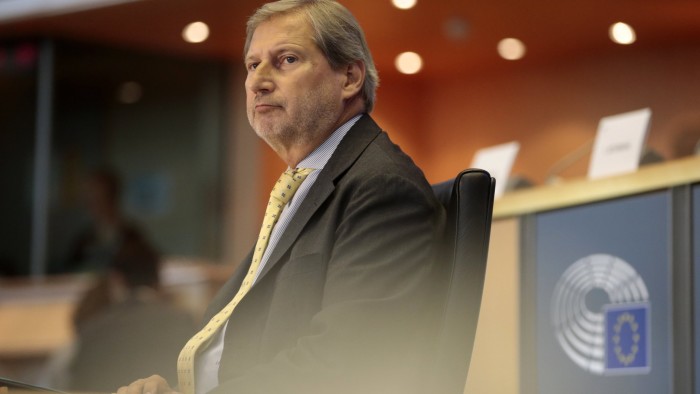EU’s gatekeeper laments bloc’s message to would-be Balkan members

Roula Khalaf, Editor of the FT, selects her favourite stories in this weekly newsletter.
Johannes Hahn faced a problem when he was appointed as Brussels’ commissioner in charge of enlarging the EU: meeting that crucial part of his job description was out of the question.
His boss, European Commission president Jean-Claude Juncker, had made clear the bloc would not acquire more members on his watch. It was an acknowledgment of the EU’s growing pains after it nearly doubled in size between 2004 and 2013.
Mr Hahn’s job was to keep aspirant EU nations — mainly in the Balkans — on track to join without being able to offer them imminent membership. But even that goal has been left in disarray after EU member states could not agree last month to endorse his recommendation that North Macedonia and Albania should proceed to formal accession talks.
The decision has opened the EU to accusations of letting Balkan nations down and neglecting a strategic and volatile region — and Mr Hahn, in an interview at the end of his five years in charge of the enlargement portfolio, made clear his frustrations at what he deemed a strategic mistake.
The failure came at “exactly the time when we should really reinforce our efforts to become a stronger global player”, the conservative Austrian politician told the FT. Losing influence “in a region so close to us, historically and geographically” would leave a vacuum to be exploited by the EU’s strategic competitors like China and Russia, he said.
Most painful, Mr Hahn said, was “the fact that the EU did not demonstrate the principle of partnership and accountability which we are always preaching and on which we could always rely”.
French President Emmanuel Macron in effect blocked the opening of negotiations with Skopje and Tirana. Mr Hahn vented frustration that Paris scuppered opening talks with North Macedonia, even after it reached a deal with Greece on the extremely sensitive issue of its name.
He said this insulted the years the commission spent laying the political framework for an agreement and sent the wrong message to regional leaders.
“The accession process is merit-based and if we don’t acknowledge progress there will be no incentive for reforms,” he said.
Mr Hahn revealed that shortly after the decision to block accession, Serbian President Aleksandar Vucic told him it was “unclear why he should, after recent developments, be motivated to enter into negotiations” with its former province Kosovo, whose independence Belgrade still does not recognise.
Such sentiments are a blow to the EU, which has spent almost a decade trying to mediate talks between Belgrade and Pristina.
Majda Ruge, a fellow at Johns Hopkins SAIS, said that while the prospect of joining the bloc “was hardly sufficient to motivate genuine reforms in the past, the membership narrative was crucial for legitimising those that did take place as a result of pressure by either the US or key EU member states”.
Ms Ruge said it would now be harder for leaders in the Balkans to justify painful reforms until there was an improvement in this momentum.
Despite the dramatic end of his mandate, Mr Hahn said that he was proud of the progress made during his tenure in improving the ties between the countries in the region — Albania, Bosnia and Herzegovina, Kosovo, Montenegro, North Macedonia, and Serbia — which are still struggling to overcome the wars and upheaval of the 1990s.
He noted that the EU had invested almost €1bn in the region through interconnectivity funds since 2015 and said interregional trade had grown 20 per cent.
He also lauded a plan to end roaming fees for the region’s mobile phone users by 2021 based on the EU’s model.
Meetings of leaders of all six countries had become commonplace, said Mr Hahn. He also cheered the fact that the leaders of North Macedonia, Albania and Serbia have taken an initiative to pledge to lift non-tariff barriers to trade.
Mr Vucic recently told the Financial Times he would focus on improving regional ties in the wake of the EU’s failure to open accession talks with Skopje and Tirana, but observers worry that true progress will be hindered without EU credibility to resolve thorny bilateral issues like the dispute between Serbia and Kosovo.
Bosnia and Herzegovina, which remains mired in stagnation and unable to form a government more than one year after elections, also needs to undertake crucial reforms. Serbia, meanwhile, has been “backsliding, not progressing” on aligning its foreign and security policy with Brussels, said Mr Hahn, noting that last month Belgrade joined the Eurasian Economic Union, the Russia-led economic grouping.
Some Balkan policy experts have proposed that the western Balkans should be given the opportunity of closer EU links even without joining — such as entry into the bloc’s single market. The idea would be to better prepare the states for eventual membership.
But Mr Hahn said that while he endorsed deeper regional engagement, he rejected proposals for anything short of full EU membership for all the western Balkan countries.
“I have always said that my vision is to prepare each candidate country to . . . be a full member from day one, including participation in the Schengen [passport-free travel] area,” he said.
Bulgaria and Romania joined 12 years ago but without access to the bloc’s free travel zone and under a special rule of law monitoring mechanism, which he described as “necessary but also humiliating”.
Mr Hahn said it would take time to undo the damage wrought by the EU’s indecision on expanding membership, but that he was still optimistic because the vast majority of member states supported the commission’s recommendation to open negotiation with Skopje and Tirana.
“At the moment everyone is perplexed and paralysed, but I hope we can overcome this as soon as possible . . . There are many areas where we as Europeans have to deliver.”
Comments